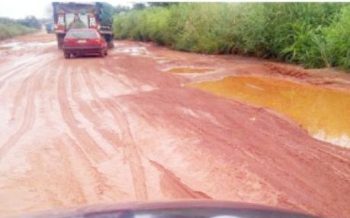
Early this year, the Minister of Works, Power and Housing, Babatunde Fashola blamed abandonment of the East-West road project by the Federal Government on economic recession.
However, dark clouds have been repeatedly cast over the road, which has received poor government attention since 1999. The 15-kilometre Eleme-Onne Port section of the road has been the worst for it with several human casualties to boot. The progressively deteriorating state of the road for almost two decades has forced commentators to conclude that government is deliberately playing the ostrich on an issue that borders on the lives and wellbeing of millions of people and that requires strong intervention.
The onset of the rainy season this year has again made the road the biggest nightmare for motorists, worsening the sufferings of hapless citizens and businesses in that area. Between the Eleme and Onne Port junction, motorists spend not less than five hours on a journey that should ordinarily not be more than ten minutes.
For residents, trekking has become a way of life and “no day passes without people raining curses on government for putting them through unwarranted hardship,” according to an indigene of Onne.
While it is not in contention that the present government inherited a battered economy, abandoning the Eleme-Onne Port stretch of the East-West road, for any reason, is certainly not in the best interest of the nation’s economy, considering the strategic businesses and investments located in the area. The story of the East-West road is like the story of the Ijora-Wharf road and the Apapa-Oshodi expressway, both in Lagos. These two roads are the major arteries linking the two largest seaports in Nigeria to other parts of the country, yet despite generating as much as N20 billion into government coffers every week, according to analysts, government finds it difficult to invest a little fraction of that revenue into repairing the roads.
Onne Port is perhaps the most important, and certainly the most efficient, seaport in the Southeast/Southsouth axis of the country. The port also hosts the Onne Oil and Gas Free Zone, which in turn hosts more than 180 companies; generating more than N100 billion in taxes and other revenue forms into government coffers annually. It is therefore heartrending that the road that leads to such facilities would be left unattended to for several years.
Recently, the Rivers State Government raised N3 billion from private companies operating in the Onne-Eleme axis purportedly to repair the road. While the response of the private sector operators to the State Government’s call is commendable, the same cannot be said of the shoddy manner in which the repair was handled. Otherwise, how could N3 billion be pumped into a 15-kilometre road stretch for palliative repairs and the road becomes completely impassable one year after? This amount translates to a spending of N200 million per kilometre or N200,000 per metre. That amount is indeed enough to reconstruct the road. However, road users argue that the present state of the road is even worse than its pre-repair condition.
We are however aware that the responsibility for repairing the road is not that of the State Government or of the private businesses operating in the area. The Federal Government must therefore wake up to its responsibilities and begin repair of that road this year. The people and business in that part of the country have suffered enough.
Copyright Ships & Ports Ltd. Permission to use quotations from this article is granted subject to appropriate credit given to www.shipsandports.com.ng as the source.